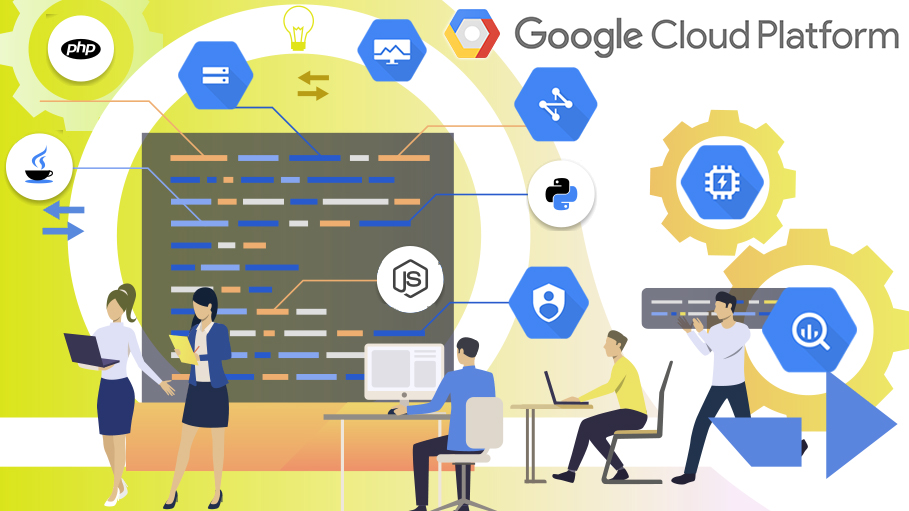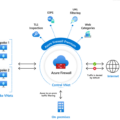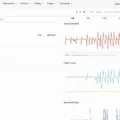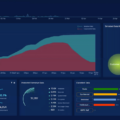Google Cloud Platform (GCP) offers an array of tools for developers and DevOps teams to help them make the most of their cloud computing environment. With GCP, users have access to powerful tools like App Engines, Storage, Databases, Networking, Operations, and Developer Tools. Let’s look at each one in more detail.
App Engine: Google’s App Engine lets you build and host applications on the same systems that power Google’s own applications. It’s the most popular service on the GCP platform and it makes it easy to manage applications with built-in scalability and high availability. You can also use it to create custom container images for your applications.
Storage: GCP provides a variety of storage solutions including persistent disks, object storage, NoSQL databases, BigQuery, and Cloud Spanner. These services provide reliable data storage solutions that make it easy to store large amounts of data safely in the cloud.
Databases: GCP offers a range of managed database solutions including Cloud SQL and Cloud Spanner that make it easy to set up and manage relational databases in the cloud. You can also use BigQuery for analytics or MongoDB Atlas for NoSQL databases.
Networking: GCP offers networking solutions such as VPC Service Controls to protect your network from intruders or threats from outside or within your network. Virtual private networks (VPNs) are also available for securely connecting disparate networks over the internet or other public networks.
Operations: GCP provides operations management tools such as Stackdriver that let you monitor your resources in real time and quickly identify issues so you can take corrective action before they become problems. It also includes services like Compute Engine which enables you to quickly provision virtual machines on demand without having to wait in line with other customers.
Developer Tools: The GCP platform includes a range of developer tools such as Cloud Source Repositories which allow you to store source code securely in the cloud while still retaining full control over its usage rights. You can also use Kubernetes Engine which is a powerful cluster management system that simplifies deploying containers and managing their lifecycle across different environments like development, staging, production, etc…
Finally, there are other developer tools such as Cloud Endpoints which enable developers to quickly build APIs without having to write code from scratch or manage servers themselves – all these features help streamline development time significantly!
Data Analytics: If you need advanced analytics capabilities then GCP has you covered with services like BigQuery which allows businesses to analyze large datasets quickly and easily using SQL-like syntax; Dataflow which helps automate data processing pipelines; AI Platform which enables businesses to leverage machine learning models; Pub/Sub which helps distribute messages between applications; Data Studio for creating visualizations; and much more!
AI & Machine Learning: If your business needs advanced AI capabilities then GCP is an ideal choice with its AI Platform offering fully managed ML models along with training services that make it easier than ever before for businesses to build their own custom ML algorithms without having any specialized skillsets required.. Additionally, there are many pre-trained ML models available through Google’s AutoML Vision service that can be used by virtually anyone with no prior experience!
So there you have it – Google Cloud Platform offers an array of useful tools designed specifically for developers and DevOps teams so they can get the most out of their cloud computing environment! Whether you need reliable storage solutions or advanced AI capabilities – GCP has something for everyone!

The Benefits of Using Google Cloud Platform (GCP) Tools
Google Cloud Platform (GCP) is a suite of cloud computing services offered by Google. It consists of a set of tools, services, and solutions that enable users to develop, deploy, and manage applications in the cloud. GCP provides a range of features including Infrastructure as a Service (IaaS), Platform as a Service (PaaS), Compute Engine, Storage, Big Data & Analytics Solutions, Machine Learning & AI Solutions, Networking Solutions, Containers & Kubernetes Solutions. GCP also provides access to various platforms such as App Engine and Cloud Functions for building enterprise apps on the cloud quickly and easily. Additionally, GCP offers many powerful tools to help speed up development cycles such as Cloud Shell for managing resources in the cloud directly from your browser. GCP also allows developers to connect their applications with other third-party services like Salesforce or Google APIs such as Maps and YouTube. With GCP users can scale their application’s performance according to demand without having to worry about provisioning servers or managing hardware. Overall, GCP enables users to build secure applications quickly and efficiently while reducing costs associated with hardware overheads.
Tools Available on Google Cloud Platform
Google Cloud Platform (GCP) offers a wide range of tools to meet the needs of software development, DevOps, and testing. From popular cloud-native languages such as Java, Ruby, and Python to compiled languages like C# and Go, GCP provides developers with access to a powerful set of tools for building applications. Additionally, GCP includes frameworks for web development such as JavaScript (JS) and PHP.
For DevOps teams, GCP provides integration with popular automation tools like Chef, Puppet, Ansible, SaltStack, Docker Swarm, and Consul. These allow for the seamless deployment of applications both in the cloud and on-premises scenarios. For testing scenarios, GCP offers the ability to spin up virtual machines quickly using its Compute Engine service and perform load tests using its Load Balancer feature. Additionally GCP also provides a robust suite of analytics services such as BigQuery which enable users to analyze large datasets in real-time.
In short, GCP offers an extensive range of tools tailored to specific needs; from coding languages to analytics services – giving developers access to the right tool for their project requirements.
Utilizing GCP Developer Tools for Improved Development
GCP Developer Tools is a suite of fully-managed development environments on Google Cloud that provide developers with built-in security and flexibility. These environments allow developers to access their projects anytime via their browser or a local IDE and are secured with features like VPC Service Controls and forced image updates. Additionally, GCP provides multi-editor support and container-based customization for further customizing the development experience. With GCP Developer Tools, developers can easily create, edit, and manage applications from anywhere in the world.
Components of Google Cloud Platform
The Google Cloud Platform (GCP) consists of a suite of cloud-based services and tools that enable businesses to build, manage, and scale their applications. GCP provides a wide range of services in areas such as computing, Storage, Databases, Networking, Operations, Developer Tools, Data Analytics, AI, and Machine Learning.
Compute: GCP offers several compute options such as App Engine for building web applications, Compute Engine for running virtual machines on Google infrastructure, and Kubernetes Engine for container orchestration.
Storage: GCP offers storage solutions such as Cloud Storage for object storage and BigQuery for petabyte-scale data warehousing. It also provides persistent disks to store your application data on the cloud.
Databases: GCP provides services such as CloudSQL for relational databases and Cloud Spanner for distributed databases with global replication capabilities.
Networking: GCP offers networking services such as Virtual Private Cloud (VPC) to create isolated networks on the cloud and Cloud Interconnect to connect your existing networks with the cloud. It also provides load-balancing services to distribute traffic across multiple instances or servers.
Operations: GCP provides operations services such as Stackdriver Monitoring to monitor application performance and Logging & Error Reporting to detect errors in real-time. It also has Stackdriver Debugger which helps developers debug their applications in a production environment.
Developer Tools: GCP offers a wide range of developer tools like App Engine Flexible Environment which allows developers to deploy applications written in any language or framework on App Engine. It also provides Cloud Source Repositories which is a private Git repository hosting service similar to GitHub.
Data Analytics: GCP offers data analytics services such as BigQuery which is an interactive data warehouse service used by analysts and other users with SQL skills for data exploration, visualization, and analysis. It also provides Dataflow which is used for streaming analytics or batch processing of data from various sources like websites or mobile apps etc.
AI & Machine Learning: GCP provides AI & ML Services like AutoML which helps developers build models quickly without prior ML experience; TensorFlow which is an open source ML platform; Vision API which is used for image recognition; Speech API which is used for speech recognition; Natural Language API used for text analysis; Video Intelligence API used for video analysis; Dialogflow Enterprise Edition used for building conversational user interfaces etc.
Is Google Cloud Platform an ETL Tool?
No, Google Cloud Platform (GCP) is not an ETL tool. However, it does have a variety of powerful ETL tools that allow you to automate the data extraction, transformation, and loading process. These tools include data preparation, pipeline building and management, and workflow orchestration services.
Data preparation tools such as Cloud Dataprep by Trifacta allow users to easily explore and prepare large amounts of data for analysis. By using a drag-and-drop interface and natural language processing capabilities, users can quickly transform raw data into clean and structured datasets.
Cloud Dataflow is Google’s managed pipeline building and management service. It provides an easy way to create robust pipelines that are capable of ingesting streaming or batch data from multiple sources while simultaneously transforming it into new insights or use cases. Additionally, its scalability allows it to handle large volumes of data with ease.
Finally, Google’s workflow orchestration service Cloud Composer simplifies the process of managing complex multi-step ETL jobs by providing an easy-to-use UI for task scheduling and monitoring. Cloud Composer also makes sure that all ETL tasks run in order without any delays or errors.
In conclusion, GCP provides a comprehensive suite of ETL tools that make it easy to build reliable pipelines for quickly extracting, transforming, and loading your data into other applications or services for further analysis or use cases.
Examples of Google Cloud Platform
Google Cloud Platform (GCP) is a suite of cloud computing services offered by Google. GCP provides infrastructure as a service, platform as a service, and serverless computing environments. Examples of services include BigQuery for data analytics, Compute Engine for virtual machines, Cloud Storage for object storage, and Cloud Spanner for relational databases. It also provides services such as Firebase for mobile development, Kubernetes for container orchestration, and AI Platform for machine learning. GCP also offers various other services such as Security & Identity Management, Networking & Content Delivery Networks, Storage Solutions, and the Internet of Things (IoT).
The Use of BigQuery as a Google Cloud Platform Tool
Yes, BigQuery is a tool within the Google Cloud Platform (GCP). BigQuery is an enterprise data warehouse that allows users to analyze vast amounts of structured and unstructured data in a cost-effective and scalable manner. It enables businesses to store, query, and analyze large datasets quickly, securely, and at a fraction of the cost of traditional solutions. BigQuery integrates with other GCP services such as Cloud Storage for data storage, Cloud DLP for data security, Stackdriver for monitoring and logging, AutoML for machine learning, and Dataflow for streaming. With BigQuery, businesses can gain insights from their data to drive decisions that help them improve operations and achieve their goals.
Number of Products Available in Google Cloud Platform
Google Cloud Platform (GCP) offers over 100 products and services. These products and services can be divided into four main categories: computing, Storage, Big Data, and Services.
The Compute category includes options for virtual machines (VMs), containers, serverless computing, application development, and more. Options for storage include persistent storage, object storage, relational and NoSQL databases, archival storage, data warehouse solutions, and more. Big Data offerings include analytics tools such as BigQuery, machine learning services like Cloud ML Engine, and video intelligence APIs to extract data from videos using machine learning algorithms. Finally, the Services category includes various cloud-based services such as Cloud Functions for event-driven computing tasks; Cloud Pub/Sub for messaging; Cloud IAM to control access to GCP resources; Cloud Endpoints which provide an easy way to create APIs; and many more.
In total there are over 100 different products in GCP that cover a wide range of needs for businesses of all sizes.
Understanding Google Cloud Platform (GCP) in DevOps
Google Cloud Platform (GCP) is a cloud-computing platform designed to provide services and resources for developers and IT professionals to build, test, deploy, and manage applications. GCP provides a wide range of services such as virtual machines, storage, networking, analytics, and machine learning. GCP also includes tools for DevOps such as configuration management, the policy as code, container orchestration, continuous integration/continuous delivery (CI/CD), and event-driven architectures.
GCP helps organizations reduce complexity in the development process by providing an integrated set of tools that streamline operations workflows. It also helps organizations increase their efficiency by allowing them to create sample templates or models that can be applied across different projects. Additionally, GCP makes it easier to monitor and enforce infrastructure compliance through its policy-as-code feature. Finally, GCP allows users to easily manage web applications through its cloud platform.
The Benefits of the Google Cloud Platform
1. Outstanding Availability and Uptime: Google Cloud Platform (GCP) provides users with reliable and consistent uptime, ensuring that services remain available even during unexpected spikes in demand or other disruptions.
2. Live Migration of Virtual Machines: GCP’s live migration feature allows users to move virtual machines between physical resources without disrupting service availability.
3. Free Uptime Monitoring: GCP offers free monitoring capabilities that allow users to keep tabs on their system’s performance and availability.
4. Leading Global Infrastructure: GCP’s global infrastructure is one of the most robust and secure in the world, ensuring optimal performance for users regardless of their location.
5. Unrivalled Throughput: GCP offers high-speed data transfer speeds, allowing users to move large amounts of data quickly and easily without any delays or slowdowns.
6. Performance Optimization With Network Service Tiers: GCP’s Network Service Tiers feature allows users to customize their network configuration to optimize performance according to specific needs and requirements.
7. Continued Dedication to Network Expansion: Google is continuously expanding its global network, making it possible for users around the world to access its services quickly and reliably regardless of their location or connectivity type
Conclusion
Google Cloud Platform (GCP) offers a comprehensive suite of cloud computing services and tools for DevOps, software development, and testing. With GCP, developers have access to popular DevOps tools such as Chef, Puppet, Ansible, Salt, Docker, Consul, and Swarm. Furthermore, GCP provides built-in security measures such as VPC Service Controls and forced image updates. Multi-editor support and container-based customization are also available for developers. Additionally, GCP provides services for computing, storage, databases, networking operations and developer tools all of which enable the development of applications on the same systems that power Google applications. Finally, data analytics and AI/ML services are available to help developers to build high-performing applications with advanced features. All in all, GCP provides an impressive array of cloud computing services and tools that are suitable for almost any type of development project.








